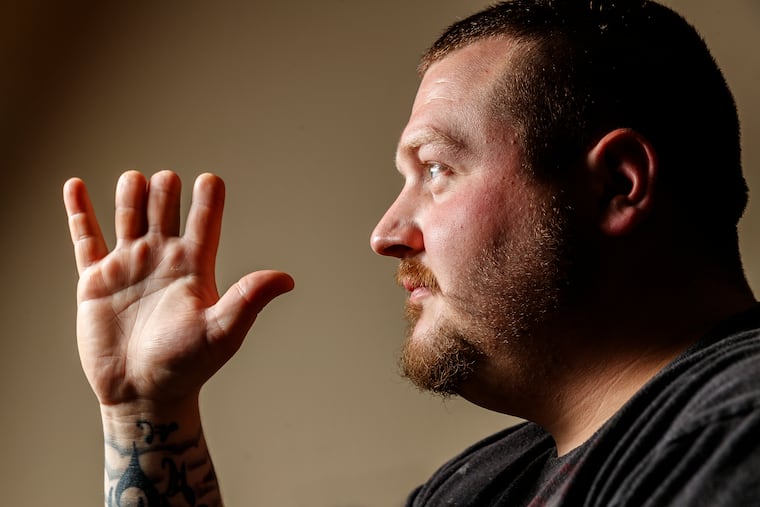Philly suburban factory owner fined $1 million for retaliatory firings
A federal jury had found that owner William “Billy” Lloyd fired two employees who cooperated with OSHA inspectors investigating an accident.

A federal jury decided in April that Montgomeryville’s William “Billy” Lloyd retaliated against two of his factory employees, including the plant manager, when he fired them in 2014 and 2015 after they cooperated with federal safety inspectors.
This month, U.S. District Judge Mitchell S. Goldberg told Lloyd what those firings would cost him. He ordered Lloyd to pay the former workers $1,047,399 in back wages and punitive damages.
At the time of the firings, officials with the Occupational Safety and Health Administration (OSHA) were investigating the company for an accident that caused parts of three fingers of a worker to be “crunched off” by a steel-bending press. The worker, Josh Elbode, 21, said the press was malfunctioning.
Goldberg awarded plant manager Dino Sanna $829,689, according to his order dated Aug. 9. Of that amount, $400,000 was punitive damages with the rest back wages. Hourly worker Matthew Spillane was awarded $217,710, with $100,000 of that amount punitive damages.
Sanna, 69, spoke with OSHA investigators with Lloyd’s knowledge, but was fired on the same day that OSHA fined Lloyd Industries $822,000 for safety violations in 2015.
Spillane photographed Lloyd Industries equipment with his mobile phone for Elbode’s workers’ compensation claim. Elbode gave the photos to OSHA. “I didn’t want anybody else hurt on that machine,” Spillane explained in an interview earlier this year. Lloyd fired him as he clocked in for his shift in November 2014.
Spillane, 34, of Chalfont, who had to sell his car and move in with his mother-in-law after the firing, said Wednesday that he was “happy and relieved” with Goldberg’s decision. “There is a possibility that I can pay off all my debt,” he said.
Goldberg, in explaining his decision, said that Spillane and Sanna were “terminated publicly in the plant and alarmingly close in time to OSHA events.” Lloyd also has to post an anti-retaliatory notice in his 60-employee Montgomeryville factory for two months, according to Goldberg’s order.
OSHA, part of the Labor Department, has designated the firm as a “severe violator,” with 40 serious injuries over almost two decades.
Morgan Lewis lawyers representing Lloyd and his company did not respond to requests for comment. Lloyd, who also did not return a call, has spent millions of dollars defending himself, according to testimony.
As part of his defense, Lloyd has testified that OSHA fails to enforce its rules consistently, and that “no two inspections have been alike. One guy will come in and say, ‘That’s not correct, who told you to do that?’ And I would tell him, and I get fined for it. I had two inspections in Florida and didn’t get fined at all.” Lloyd also owns a factory in Florida.
“The court recognized that all employees have a federally protected right to speak out against unsafe and unhealthy working conditions, to participate in U.S. Department of Labor investigations, and to be compensated if they are terminated in retaliation for exercising those rights,” said Philadelphia regional solicitor Oscar L. Hampton III said. “The significant punitive damages send a strong message to this employer and others that deliberately violating these laws will not be tolerated.”
Based on documents The Inquirer obtained under the Freedom of Information Act, the whistleblower case filed by the Labor Department in 2016 was the culmination of a long-running dispute between Lloyd Industries and OSHA over safety.
OSHA inspected or fined Lloyd Industries in 2000, 2002, 2005, and 2008, as well as 2014, generating more than 7,000 pages of documents. They show that Lloyd failed to comply with safety precautions that he agreed to in settlements with OSHA, such as testing for factory noise and installing guards on machines, even as amputations and related injuries became a growing concern.
An entrepreneurial tool-and-die maker, Lloyd launched his manufacturing firm in his mother’s garage in the early 1980s. Lloyd Industries now manufactures smoke and fire dampers for ducts in big buildings and HVAC equipment. Dampers inside ducts protect buildings against spreading smoke or fire with louvers that snap shut.
The whistleblower case is the second legal setback this year for Lloyd.
In April, U.S. District Judge Michael M. Baylson ordered Lloyd Industries to pay former factory worker Ronald Watson $600,000 for firing him because he was black after a Philadelphia jury found in favor of Watson in a racial discrimination case. Last month, Lloyd Industries appealed the case to the U.S. Court of Appeals for the Third Circuit.